
[caption id="IronLady_Feature" align="aligncenter" width="1024"]
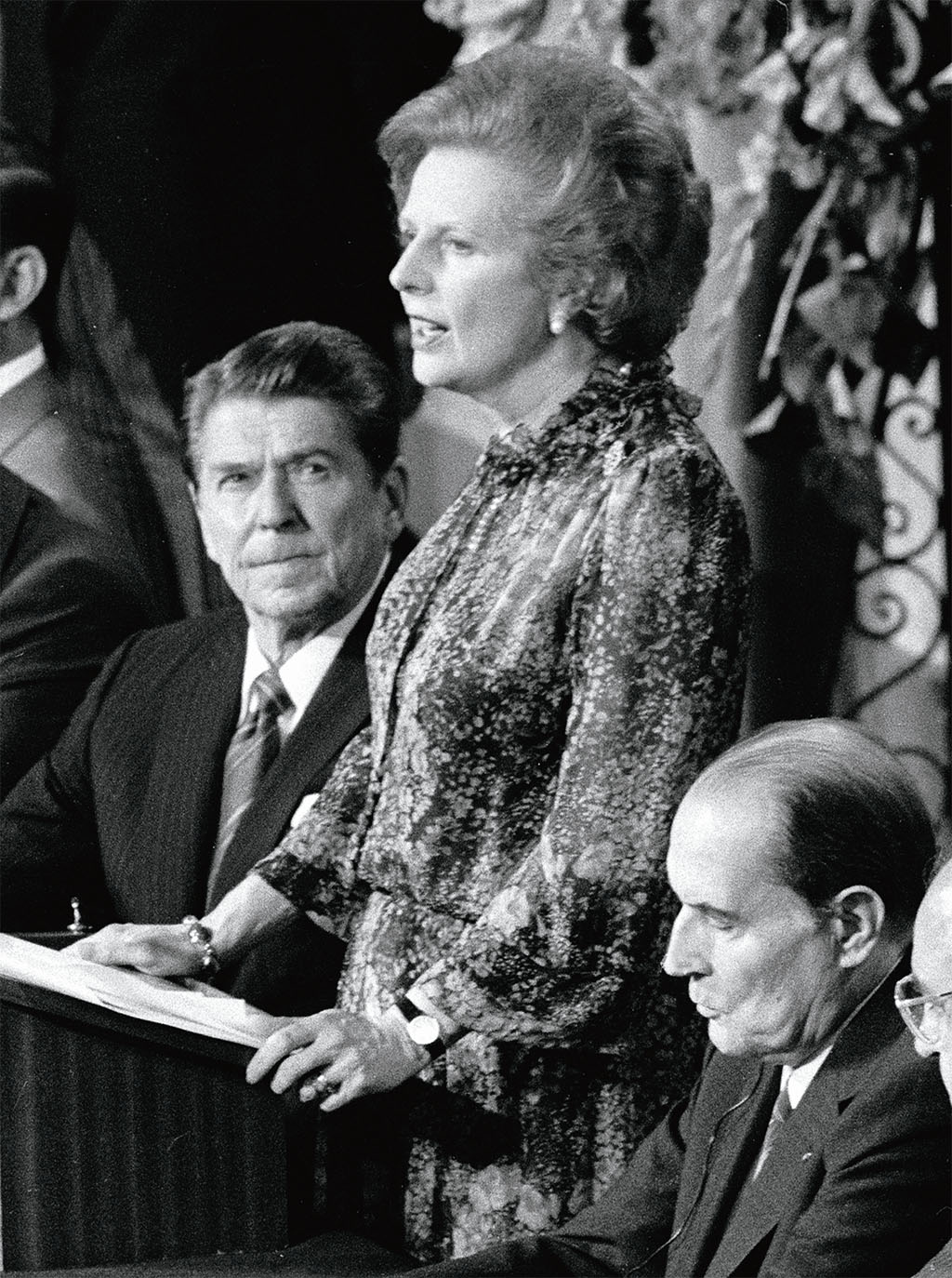
© BETTMANN/CORBIS
MARGARET THATCHER
famously opened a ministerial meeting by thumping her handbag on the table and announcing, ‘I haven’t much time today, only enough time to explode and have my way!’
A Conservative minister later remarked that she “carried the authority of her office always with her. It was in her handbag….She was asserting it the whole time.” Just as Chamberlain had had his umbrella and Churchill his cigar, “Maggie’s” physical and metaphorical prop was her handbag. It contained crumpled notes full of facts and figures that could floor an interlocutor at 20 paces. “She cannot see an institution without hitting it with her handbag,” another observer wrote.
The “handbagger”—prime minister for 11 years, six months and 24 days (1979-90)—turned around the ruinously ailing British economy of the 1970s and shook the nation out of its demoralized slough. She broke the mold—she was the first woman prime minister in Europe and the longest-serving head of government in Britain in the 20th century. She achieved iconic status in the Conservative Party and, as the country’s representative, internationally. “Thatcherism” became a label not just for her aggressive “conviction” politics but also a byword for the changed spirit of the 1980s.
It’s a paradox, then, how much Thatcher was an Establishment outsider. She herself noted, in her autobiography The Path to Power, “I was often portrayed as an outsider who by some odd mixture of circumstances had stepped inside and stayed there for eleven and a half years; in my case the portrayal was not inaccurate.” By virtue of her social and nonconformist religious background she was an outsider in the patrician Conservative Party. By her heretical economic views she was a minority voice. By her individualism in the notoriously clubby world of politics, she generated suspicion. By her behavior in the European arena, she made heads of state bristle. By her very handbag, that symbol of femininity, she stood out from the male crowd of politicians. And by the fact that she wielded it with such masculine force she seemed an aberration of genteel womanhood. What shaped such individualism?
MARGARET HILDA Roberts was born October 13, 1925. Her father, Alfred, a self-made man, ran a grocery with his wife, Beatrice, in the provincial Lincolnshire market town of Grantham. They had an elder daughter, Muriel, born in 1921. Home was, Margaret recalled, “practical, serious and intensely religious.” Indeed life revolved around Methodism, with its churchgoing and music. Young Margaret became an accomplished pianist.
This childhood living over the shop was “an idyllic blur,” with customers coming and going, Margaret helping to weigh out sugar, tea and coffee. The grocer’s daughter learned the basic tenets of economics, and from her mother she absorbed the efficient, make-good-and-mend housekeeping of the self-respecting middle class, virtues accentuated by World War II privations. Her father was an upstanding figure in the community, a lay preacher, an independent town councilor and later alderman. “Individual responsibility was his watchword and sound finance his passion,” Margaret remembered. From him she claimed her integrity— and a fondness for homespun aphorisms. “Never do things just because other people do them” was a favorite, and it was to stand the Grantham girl in good stead.
The family was “highly political,” and Margaret, aged just 10, could be found folding general election leaflets for a local Conservative candidate. At Kesteven and Grantham Girls’ (grammar) School she was a diligent but not star pupil; blessed with logic and determination, she shone in the debating society. She took elocution lessons—a prerequisite for getting on in the world.
Hers was also a dreamy nature. She loved Rudyard Kipling, the patriotic poet of British Empire, and the exotic worlds beyond Grantham that he portrayed. And when the cinema arrived in town, she was entranced by Hollywood romance, reflecting that maybe it was a “fortunate restraint” that she was not allowed to watch films too often.
Margaret won a place to study chemistry at Somerville College, Oxford, in 1943. She cut a rather serious, slightly lonely figure: work, religion and, increasingly, politics filled her time rather than socializing. In 1946 she became president of the Oxford University Conservative Association—only the second female to hold the post in its history. Strange, perhaps, that a middle-class grammar school girl should be drawn to an essentially public school-dominated party. But its dicta, such as self-reliance, appealed to her. When she left Oxford with a second-class chemistry degree, she joined BX Plastics near Colchester to work in research and development. However, she knew her true ambition was to be a member of Parliament.
She got her wish, after a struggle, in 1959 when she was elected Conservative MP for Finchley, north London. It had been a busy decade post-Oxford: in 1951 she wed Denis Thatcher, a well-to-do businessman and divorcé 10 years her senior. Early married life was “very heaven,” and in ensuing years in a series of homes in London and Kent she enjoyed interior decorating, gardening and collecting porcelain. Denis’ income meant Margaret no longer needed to earn a living, and she studied law. In 1953 she gave birth to twins, Mark and Carol; by the time they were 6 months old she had passed her bar exams. “While the home must always be the centre of one’s life, it should not be the boundary of one’s ambitions,” she liked to say. Fortunately, the Thatchers could afford a nanny to allow this.
The London Evening News heralded Margaret Thatcher’s entry into Parliament with the headline “Mark’s Mummy is an MP Now.” Women were a rarity at this level of politics—just 25 of 630 MPs—and Thatcher was given various shadow cabinet positions in “women’s” areas such as pensions. In the 1970 Conservative government under Edward Heath, she became secretary of state for education and science (1970-74). Sadly, neither her father nor her mother had lived to see this success.
“The fifties marked the start of a major change in the role of women,” Thatcher reflected in her autobiography. In the male preserve of the House of Commons and in the cabinet she felt isolated. Her strident tone, perhaps an overcompensation as she tried to prove herself, further alienated male colleagues. Yet there were plus-points to being different. Blonde, attractive, always immaculately dressed and a zealous worker, she stood out and was for some while a media darling. The tide turned when as education secretary, forced to cut her budget, she stopped the provision of free milk to schoolchildren over the age of 7. Tabloid headlines raged “Mrs. Thatcher, Milk Snatcher” and asked if she was the most hated woman in Britain. She was deeply upset.
The Heath government fell in 1974 amid rising inflation and labor unrest. Keith Joseph, the right-wing intellectual who set up the Centre for Policy Studies to analyze Britain’s economic problems and devise a remedy, appeared set to challenge Heath as Conservative leader. He bungled his chances however, and unexpectedly Thatcher, one of his most ardent supporters, stepped into the breach. On February 11, 1975, she won the contest to head the Conservative Party.
Reactions were mixed. None of the party heavyweights had voted for Thatcher, and the victory, “the Peasants’ Revolt,” was thought a brief seizure of power by the lower orders. She was “trade” after all. Others welcomed the rise of a grocer’s daughter, believing it would help redress the Conservatives’ stuffy image.
Thatcher continued her lifelong makeover: changing hairstyle, clothes and, through further voice coaching, lowering her voice from its gratingly high pitch to a more commanding contralto. But the greatest boost to her reputation came following a speech she made in 1976 criticizing the Soviet Union when the Red Army newspaper Jrasbata Zvezda (Red Star) dubbed her “the Iron Lady.” Instantly, an icon was born. She trumpeted the role, later addressing a public meeting, “I stand before you tonight in my Red Star chiffon evening gown, my face softly made up and my fair hair gently waved: the Iron Lady of the Western World!”
[caption id="IronLady_img1" align="aligncenter" width="796"]

DANA HUNTLEY
‘Her father ran a grocery business with his wife in the Lincolnshire market town of Grantham’
WHEN THATCHER was elected Britain’s first female prime minister on May 4, 1979, it was against a background of soaring inflation, bitter labor disputes, rising unemployment and declining trade figures—a result of the collectivist and consensus policies that both Labour and Conservative postwar governments had pursued. Influenced by her upbringing and, now, the ideas of Keith Joseph and American economist Milton Friedman, Thatcher was set on what became known as monetarism and, through her implementation, Thatcherism. This economic theory advocated individual enterprise and a reduction in state intervention. State-subsidized industry and jobs instilled no incentive to compete, put too much money into the economy and encouraged inflation. Thatcherism valued individual responsibility: Taxes and government spending on state-provided welfare should be lower to allow individuals to use their money to support themselves as they choose. The state should be servant, not master.
[caption id="IronLady_img2" align="alignleft" width="457"]
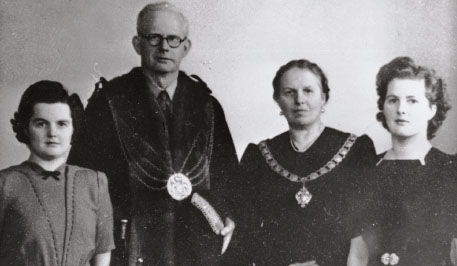
GETTY IMAGES; PA/PA ARCHIVE/PA
[caption id="IronLady_img3" align="alignright" width="290"]
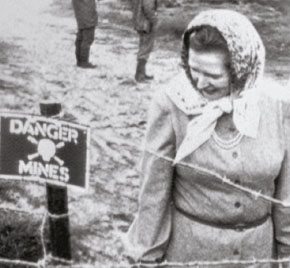
GETTY IMAGES
[caption id="IronLady_img4" align="alignleft" width="363"]
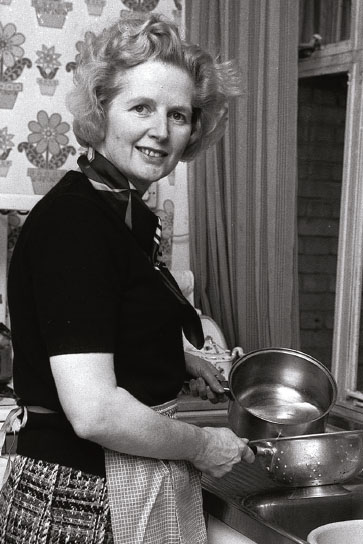
PA/PA ARCHIVE/PA
[caption id="IronLady_img5" align="alignright" width="335"]
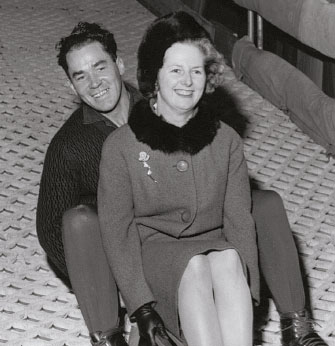
PA/PA ARCHIVES/PA PHOTOS
[caption id="IronLady_img6" align="aligncenter" width="336"]
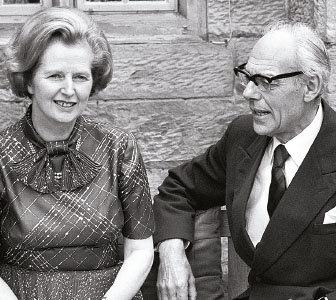
PA/PA ARCHIVES/PA PHOTOS
Thatcher ushered in a decade of painful reform, privatization, deregulation and tax cutting. At first inflation and unemployment rocketed, some businesses crumbled. But—“the lady’s not for turning”—the prime minister brazened it out over three historic terms of office, wrenching the economy back off its knees. At least one widely popular measure was the sale of council houses, allowing by 1982 a half-million people to become homeowners (and possibly Tory voters) for the first time.
Paradigmatic of Thatcher’s ruthless resolve—and crucial to the success of monetarism—was her defeat of the National Union of Mine Workers, which, in March 1984, called a strike over plans to close unprofitable pits. The threat to the national fuel supply raised the specter of an ungovernable country. The strike lasted a year and saw police and miners in ugly pitched battles. But Thatcher had stockpiled coal reserves, ready to defend democracy against her bête noire of socialism, the militant trade unions. She won. Whole mining communities suffered badly, yet the greater community of democratic Britain survived. Tougher legislation was later introduced to curb future union power. The general mood of the country, fed up with disruptive strikes, was with Thatcher on the need for change.
THE PRIME MINISTER was equally tough in 1984 when an Irish Republican Army bomb meant for her exploded in the Brighton hotel where Tory Party members were staying overnight for their annual conference. Having hardly slept, she appeared on the conference platform the next day, neatly dressed and made up, defiant that democratic business should continue. The image went around the world.
If defeating the unions epitomized Thatcher on the domestic front, then victory against Argentina in the Falkland Islands was a key event abroad. Few people had even heard of the tiny British dependency (population 1,800) near Cape Horn, but invasion by Argentina in April 1982 offended every patriotic fiber in Thatcher’s body. Raised on the Churchillian belief that Britain was capable of epic things on the world stage, she sent ships to retake the islands. By mid-June the war was won—at a cost of 255 British lives. Principle had been upheld; a new sense of national confidence emerged. Thatcher’s flagging popularity ratings also benefited.
Less spectacular but truly far-reaching was Thatcher’s role in bringing about the end of the Cold War and contributing to the demise of communism in Central and Eastern Europe. As an individualist and free market advocate, she had an innate and frequently voiced distrust of communism. In Soviet leader Mikhail Gorbachev, however, she found a man she “could do business with,” and she helped to persuade President Ronald Reagan away from “evil Empire” rhetoric to do the same. The chemistry between Reagan and Thatcher made their alliance a high point of the special relationship between Britain and the United States in the 20th century. “She was warm, feminine, gracious and intelligent and it was evident from our first words that we were soul mates when it came to reducing government and expanding economic freedom,” Reagan remarked.
‘Having hardly slept, she appeared on the conference platform the next day, neatly dressed and made up, defiant that democratic business should continue’
[caption id="IronLady_img7" align="aligncenter" width="1024"]

© BETTMANN/CORBIS
Instinctively an Atlanticist, Thatcher was less easy about European union. She demanded— and got—a refund on Britain’s excessive contributions to the European Economic Community with a belligerence that set the tone for future negotiations. While in favor of a common market, she resisted measures that could inch member countries toward a federalist super state and erode British sovereignty. Britain would stand aside from mainstream integration.
Behind the scenes, Thatcher had an awesome work ethic. She slept only four hours a night and “living over the shop” at 10 Downing St. suited her (there’s a delicious irony in a grocer’s daughter running a “nation of shopkeepers”). She quickly mastered briefs in minute detail and was intolerant of “woolly” thinking. Yet, despite popular opinion to the contrary, she could be persuaded by others’ views—if well argued.
Behind the hectoring caricatures—Attila the Hen, TBW (That Bloody Woman)—a far more charming, feminine side existed and was employed to get her own way. “Perhaps we were a little bit in love with her,” one young man who worked for her recalled. She enjoyed male company, female less so (the Queen was said to dislike their weekly meetings). Staff at No. 10 adored her for the thousand small kindnesses she showed, such as asking after the health of an ailing family member. This was not the uncaring tyrant of cartoonists. On occasion she appeared blissfully unstreetwise, most famously when she declared in admiration of her faithful deputy, Willie Whitelaw, “Every prime minister needs a Willie.”
Thatcher’s home life, indeed her career, had the firm anchor of her husband Denis. The media affectionately portrayed him as a gin-swilling, golf-playing buffoon, but he fulfilled his role of consort to perfection, content to support, a silent smile on his face. He had helped give the Grantham girl social confidence, and his money had allowed her to chase her ambition; his own success meant he felt unthreatened by her achievement. He encouraged, advised, gave the arm that consoled, and he alone could call latenight meetings to a close, tapping his watch and reminding, “Margaret, time for Bedfordshire.” In the morning, Margaret would cook his breakfast. She also doted on her son, Mark; relations with Carol seemed a little less close.
[caption id="IronLady_img8" align="aligncenter" width="756"]
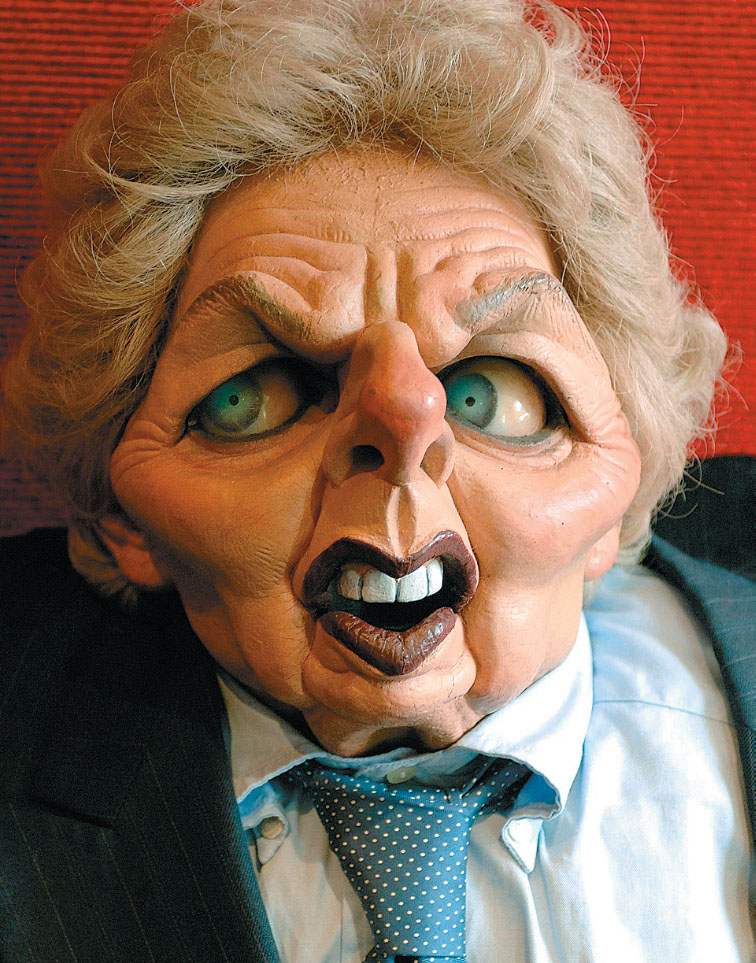
JOHN STILLWELL/PA WIRE/PA PHOTOS
FROM 1984 TO 1996, the satirical puppet show Spitting Image lampooned both British and American politicians, celebrities and erstwhile public figures in its weekly television show on ITV. On center stage, of course, was then Prime Minister Margaret Thatcher. Her latex caricature was portrayed as domineering and sneering. In one famous sketch, Thatcher sits down to lunch with her all-male cabinet colleagues.
Waitress: Would you like to order, sir?
Thatcher: Yes, I will have the steak.
Waitress: Howdya like it?
Thatcher: Oh, raw, please.
Waitress: And what about the vegetables?
Thatcher: Oh, they’ll have the same as me.
The public rarely glimpsed any chinks in the Iron Lady’s armor, and in the end she stayed too long in power. She was perceived to be arrogant, dictatorial, contemptuously handbagging her cabinet colleagues. She badly misjudged when she introduced the notorious poll tax despite advice against it; she openly clashed with her chancellor over monetary policy and with her foreign secretary on European policy. Both resigned, precipitating a party leadership battle, which concluded in Thatcher’s resignation on November 28, 1990. She was cast back outside. For once the tears were public as she left 10 Downing St.
Elevated to the House of Lords, she styled herself Baroness Thatcher of Kesteven in honor of her roots. She set up the Margaret Thatcher Foundation to continue to promote her ideas and undertook lecture tours; she was particularly gratified by her welcome in the United States, “the seat of radical modern conservative thinking and almost my second home.” After a series of small strokes, doctors advised her in 2002 against public speaking. In 2003 Denis, her constant companion, died; they had been married 52 years. More than any political knocks, it was a devastating loss.
Margaret Thatcher and Thatcherism often evoke visceral love or hate. She was a role model for individualism and the success of the individual who worked hard—not always an easy trajectory in a nation of team players where traditionally it’s the playing, not the winning, that counts. Some said her policies legitimized selfishness. Feminists murmured that she failed to help other women break into public life—women were notably absent from high office in her governments. But that missed the point of her individualism, and she led by example.
Her legacy, like her life, is one of paradox. A force for change, she saved her country from the economic mire and made it governable again, but threw the Conservative Party into turmoil. She altered national attitudes: After monetarism there has been no return to Keynesian economics, and Britain is no longer the sick country of Europe. She consolidated the Atlantic Alliance and helped create the dynamics of the post–Cold War world, but left the Tory Party—and the country—deeply divided on Europe and integration into its union. However these legacies play out, Margaret Thatcher will be seen as an icon of the 20th century and one of Britain’s outstanding peacetime prime ministers.





Comments